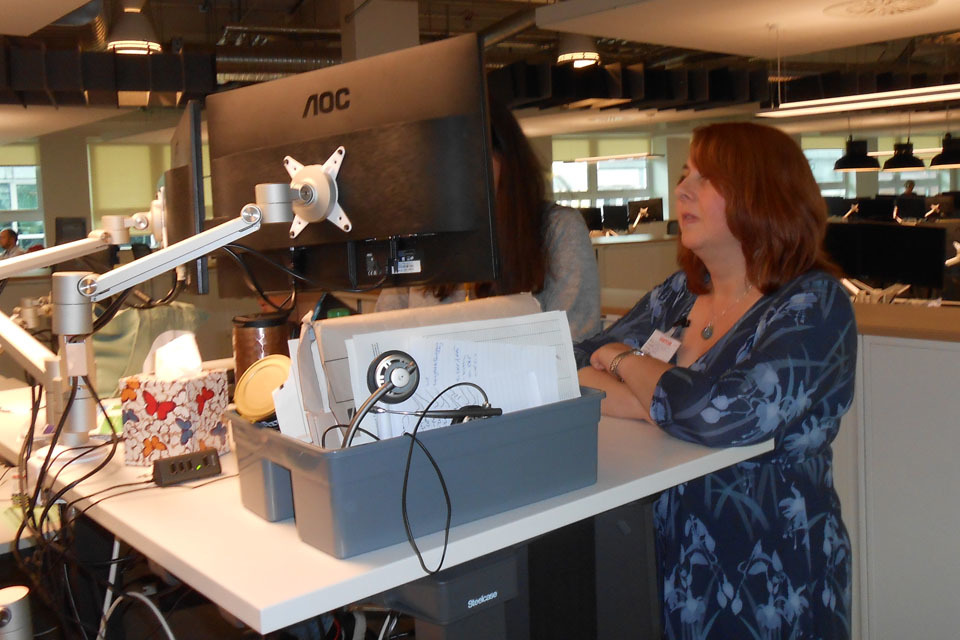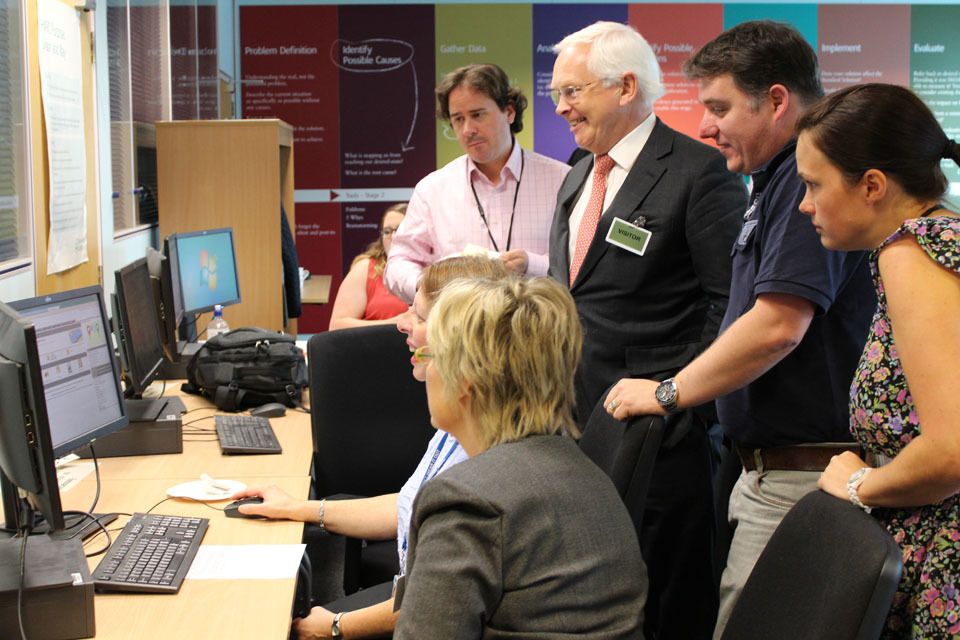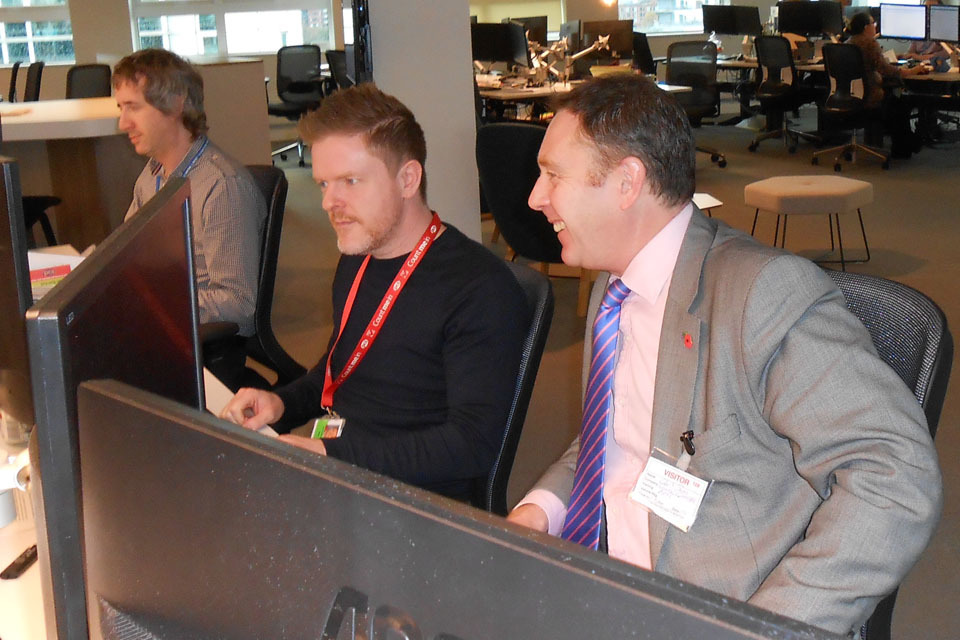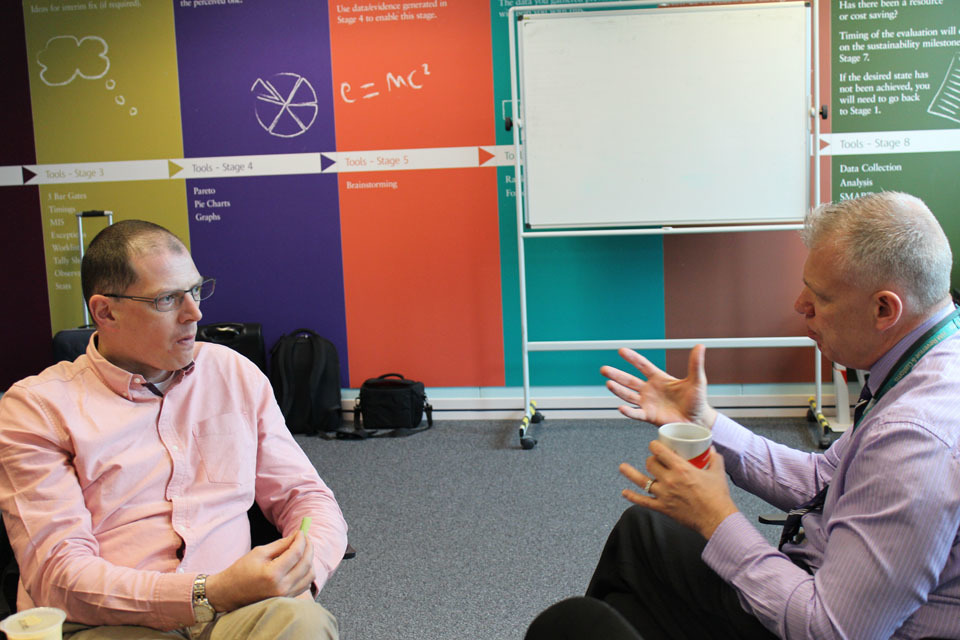Your Charter Annual Report: April 2016 to March 2017
Published 13 July 2017
Your Charter
We want to give you a service that is fair, accurate and based on mutual trust and respect. We also want to make it as easy as we can for you to get things right.
Your Charter explains what you can expect from us and what we expect from you.
| Your rights - what you can expect from us: | Your obligations - what we expect from you: |
|---|---|
| Respect you and treat you as honest | Be honest and respect our staff |
| Provide a helpful, efficient and effective service | Work with us to get things right |
| Be professional and act with integrity | Find out what you need to do and keep us informed |
| Protect your information and respect your privacy | Keep accurate records and protect your information |
| Accept that someone else can represent you | Know what your representative does on your behalf |
| Deal with complaints quickly and fairly | Respond in good time |
| Tackle those who bend or break the rules | Take reasonable care to avoid mistakes |
Charter Committee Chair’s Foreword, Joanna Baldwin

Image shows Joanna Baldwin, HMRC Board Non-Executive Director and Chair of the Charter Committee, a sub-committee of the HMRC Board.
The Charter Committee’s role is to monitor HMRC’s performance against the customer rights set out in Your Charter, and to assess how HMRC helps customers meet their obligations.
The committee brings fresh, external thinking and a different perspective as a means of covering the spectrum of customer viewpoints. The committee also offers constructive challenge when assessing the extent to which HMRC demonstrates the behaviours and values set out in Your Charter.
The present committee is in its second year of operation, and while last year’s report set out the initial ambition of the committee, this report:
- describes the committee’s more recent activity
- details the actions it took as a result of that activity
- shares the latest HMRC customer survey results, which gather regular feedback against Your Charter
- outlines some of the areas on which the committee intends to concentrate in the forthcoming year
On the basis that complaints are often the source of more fundamental issues, our starting point over the past year has been to understand how HMRC handles complaints. The committee has been a key contributor in shaping the department’s refreshed Complaints Ambition, which focuses on the key themes of listening to and acting on customers’ complaints.
The committee contributed to the public consultation exercise on Making Tax Digital for Business (which included HMRC’s introduction of quarterly digital record-keeping) from the perspective of the Charter. The committee counselled HMRC to pay attention to the accessibility challenge some customers would face – for example, as a result of the country’s digital infrastructure and provision – and to reflect this in the implementation timetable.
HMRC’s ambitious transformation programme is aimed at modernising and improving the department’s services. As the department undergoes this change, the committee will pay particular attention to how HMRC explores and applies appropriate customer service performance measures to its work. The committee will look into how HMRC uses customer feedback to provide both better services and support to customers in meeting their obligations.
Finally, I thank my predecessor, Ian Barlow, who stepped down as Chair in December 2016, and Ian Young, the first Charter Committee Chair, who kindly acted in an advisory capacity until March this year. Both have invested their considerable experience in building an effective committee.
The committee members tell me they have learned much in the last year about the department’s aim to deliver world-class customer services. They remain enthusiastic about their role and look forward to the year ahead.
Why Your Charter matters
Your Charter is important to HMRC and its customers. It sets out what customers can expect from HMRC as well as the obligations they are expected to meet.
For HMRC staff, Your Charter provides a clear framework for how they are expected to act and to deliver services for customers.
HMRC refreshed Your Charter in January 2016. The Charter Committee was inaugurated as a sub-committee of the HMRC Board in February 2016.
HMRC sets out its assessment of how it has performed against its Charter commitments in the HMRC annual report and accounts: 2016 to 2017.
This report is the Charter Committee’s own assessment of HMRC’s progress against its commitments and in supporting customers to meet their obligations.
1. The Charter Committee
Our role is to:
- review how HMRC performs against the standards of behaviours and values in Your Charter, holding HMRC to account
- provide challenge and assurance to the HMRC Board on the implementation of the Charter and its principles
- support HMRC in improving services
During the period of this report, the committee included Non-Executive Board members Diane Herbert and Alice Maynard, along with five external members. Collectively, they brought to their roles a significant understanding of HMRC’s broad customer base, and the needs of its customers.
Joanna Baldwin succeeded Ian Barlow as Chair of the Charter Committee and HMRC Board Charter Champion, on 13 December 2016. Diane Herbert stepped down from her role as a member of the committee at the end of March 2017 and Non-Executive Board member John Whiting became a standing invitee in June 2017.
The committee meets four times a year, reporting to the Board through its Chair at HMRC Board meetings and through this annual report.
1.1 Charter Committee members
The committee is deliberately diverse in its make-up, so that it may represent a wide cross-section of society, and to ensure it can add significant value to HMRC’s work. There are self-employed individuals on the committee, as well as employers. Some members are also tax professionals and some are members of representative bodies.
Below is a list of members, along with positions they hold and their experience.
| Name | Current positions and experience |
|---|---|
| Joanna Baldwin | Joanna’s career has been spent advocating the customer’s point of view. A marketing strategist by profession, Joanna’s work spans a broad range of business sectors. She currently holds positions in private and not-for-profit organisations, in addition to her role as a Non-Executive Director of HMRC and the Chair of its Charter Committee. Her particular interest is harnessing the power of technology to improve customer experience. |
| Diane Herbert | Diane has been at the heart of organisations at a senior level for more than 25 years, helping to lead change. Diane has worked across a spectrum of industry sectors, building up her corporate and HR expertise. She is currently Managing Director of Mindshift Ltd and has also held positions at Channel 4 Television, The Walt Disney Company, Diageo, Motorola and BOC in her varied career. (Diane stepped down at the start of the 2017-18 operational year). |
| Alice Maynard | Alice has dedicated her career to improving organisations that are the building blocks of society – transport, housing and social care organisations. She currently holds positions in a number of public sector and not-for-profit organisations in addition to her role as a Non-Executive Director of HMRC. Alice combines her understanding of how business works and of social issues to help the organisations she works with thrive, while working towards a fairer society. |
| Uday Dholakia (OBE) | Uday is senior partner at Global Consulting UK Ltd and Chair of the National Asian Business Association (NABA). He is a Commonwealth First Export Champion and chair of the Trade Facilitation Expert Panel at the Department for Business, Energy and Industrial Strategy (BEIS). Uday is a seasoned ‘better regulation’ expert in broadcasting, policing, electricity distribution, law, aviation and local authority regulation, and an experienced broadcaster and commentator on small and medium enterprises, and regulation. He is also a brand ambassador for Birmingham Airport. |
| Natalie Doig | Natalie has more than 18 years’ experience in the field of disability rights, equality and diversity; work she continues in her role as Director of Hareonna Diversity Ltd. Over the years, she has worked with organisations to improve the representation for disabled people, and particularly those with a visual impairment. On the Charter Committee she represents groups who need extra support, including small businesses. |
| Chris Jones | Chris has spent his career as an advocate for better understanding of the UK tax system. As a Chartered Tax Adviser and lecturer, he provides training and support to the UK tax profession through his role as Chairman of the Tolley business at LexisNexis. As a member of the Charter Committee, he champions a high level of trust and transparency between HMRC and the tax profession. |
| David Oxley | David has built his career in creating digital and security systems. He is currently Director of Engineering Quality at McAfee, where he works to improve the engineering processes and practices, ensuring consistent delivery of high-quality security products into the corporate and consumer markets. He is also a Trustee and Treasurer for the Buckinghamshire Disability Service (BuDS). |
| Susan Terpilowski | Sue started her own business, Image Line Communications, more than 30 years ago in the logistics and supply chain industry. She is currently Chair of the Federation of Small Businesses London Policy Unit, a board member of the London Business Network and Chair of the Chartered Institute of Logistics (CILT) ports, maritime and waterways sector, giving her a wealth of insight into the needs of small and micro businesses. Sue is also part of CILT’s special task group looking at Brexit and especially Trusted Trader and ‘frictionless’ borders. |
1.2 Supporting the Charter Committee
Charter Committee meetings are also attended by HMRC’s Executive Chair, Edward Troup, and Directors General, as appropriate. Members of HMRC’s Executive Committee also support Charter Committee members, to deepen their knowledge of the department and to act as channels for sharing information outside of HMRC.
Committee members are able to understand and learn more about the views of customers due to their broad experience and contacts, as well as through other routes, such as customer feedback, research and complaints data.
The Charter Committee meets HMRC customer service and compliance teams regularly to experience the work they do first-hand. This helps members to understand the range of work carried out and to ensure HMRC tailors its services to meet Your Charter commitments and supports customers in meeting their Charter obligations.
1.3 HMRC Charter Champions
Charter Champions are senior leaders in HMRC, responsible for promoting Charter principles and values. Champions report regularly on the activities undertaken by teams across HMRC, in embedding Your Charter. The committee has seen how Charter Champions ensure that HMRC’s people use Your Charter commitments in the way they work, through activities such as awareness-raising events and online interviews with HMRC Executive Committee members. The committee will continue to support Charter Champions in their efforts and seek further opportunities to add value to their work.
2. The work of the Charter Committee
Last year the committee set out an intensive programme of work in Your Charter Annual Report: 2015 to 2016. The subjects ranged from getting to know more about the Digital Transformation programme, to learning about how HMRC reflects Charter principles in its approaches to compliance, customer services and the security of data.
The committee held four meetings, hearing from HMRC Directors General and their teams, and Helen Megarry, the independent complaints Adjudicator, across a wide range of topics.
The Charter Committee has reported regularly to the HMRC Board on their reviews and recommended actions, anchoring their comments in how the Charter commitments are being met, or could be met more effectively.
In addition to holding four Committee meetings, members visited:
- a Digital Delivery Centre, London
- the Tax Credits Office, Preston
- front line Customer Services in Manchester
- Customer Compliance and Customer Services complaints practitioners
- the Adjudicator’s Office in London
- ‘Don’t Waste Complaints’ conferences in London and Manchester
“We found these visits very helpful in enhancing our understanding of HMRC’s complex business, and a really good opportunity to get to talk to staff face-to-face, and explain to them about the role of the committee in HMRC.”
“A recurring theme to me was seeing what HMRC is doing to support disabled people and how we improve that offer. Digital services can be really enabling for some disabled people but a barrier for others, so there is a really fine line that the committee has an important role in looking at.”
Natalie Doig, Committee member

Image shows Natalie Doig, Charter Committee member.
2.1 Customer services
The committee looked into HMRC’s multi-channel approach for dealing with customers. Members observed the actions taken to tackle issues, such as reducing call waiting times, and reviewing letters and notices where HMRC’s follow-up contacts with customers show that the correspondence is not always simple and clear enough for customers to understand easily.
The committee challenged HMRC on the data relating to call waiting times and whether the ‘speed of answer’ measure took account of the time spent getting through the initial automated messaging menu.
While the committee accepted that there had been a great improvement, it cautioned HMRC’s leadership that this may not yet match the high expectations in today’s multi-channel world.
The committee also provided advice and challenge to HMRC on its transformation plans as it moves from dealing with customers by telephone and post, to interacting with customers digitally and through multiple channels. Members were particularly keen to ensure that sufficient care was given to training staff and to supporting customers with no or limited internet access, or who would need help in accessing digital services.
The committee will be involved in HMRC’s review of performance measures, which aims to introduce measures that focus on customer satisfaction. This provides an opportunity for the committee to influence the design during the development stage and support HMRC to gauge customer satisfaction effectively.
“The Manchester tax operations contact centre is a great example of how new tools and skills are being used to handle customers’ needs more effectively. We saw staff juggling multiple live webchats at a time, helping customers to use digital services. The staff all showed real customer commitment – making sure they resolved questions first time and offering extra support to those who needed it.”
Joanna Baldwin, Charter Committee Chair

Image shows Charter Committee members.
2.2 Digital transformation
The committee looked at various elements of digital transformation throughout the year. The key areas members considered were:
- depth of digital testing
- quality and pace of implementation
- support for the digitally excluded
- security of online accounts
- the Making Tax Digital for Business consultation
Making Tax Digital is a key part of the government’s plans to modernise the tax system, making it easier for individuals and businesses to get their tax right and keep on top of their tax-related affairs, to bring about an increase in tax revenue. This approach was set out in the March Budget 2015, and a consultation ran from August 2016.
The committee made a significant contribution by responding as a group to the HMRC Making Tax Digital consultation, seeing how digital changes related to the Charter with specific emphasis on the impact on customers. The committee expressed particular concerns around the UK’s digital infrastructure, and how it affected customer access to online services. Members also voiced their concerns about how customer information would be protected if they were expected to self-serve with open-source software (computer software distributed free to members of the public).
The committee received a detailed account of the key themes that came out of the consultation, with comments including:
- implementation appeared ambitious – with costs and impacts for small businesses
- the government needed to help small businesses manage these costs and impact of the changes
The committee’s response aligned closely with these themes.
The committee also discussed the importance of earning the trust of customers when encouraging them to use digital services.
Members were pleased to learn that HMRC has agreed terms for collaborating with software companies. These terms will underpin their relationship with HMRC and cover aspects such as data security and customer accessibility, and how they might work together to mitigate the issues arising from any software malfunction.
“During our visit to the digital delivery centre, it was great to see how HMRC is growing delivery capability through apprenticeship schemes, and also how it is building in-house capability through acquired knowledge from expert contractors. Investing in new technology is one of the ways we’ve seen HMRC strive to improve customer service, and it was good to see first-hand the progress made by HMRC in this area.”
Chris Jones, Charter Committee member

Image shows Chris Jones, Charter Committee member.
The committee’s contribution to the consultation and the practical involvement of two committee members in the design of the personal tax account were acknowledged by HMRC as being most helpful.
In a visit to the London digital delivery centre, the committee learned how HMRC uses customer feedback to address the challenges that customers face. Members also saw first-hand how HMRC collaborates with other government bodies to make progress with the government’s vision of providing joined-up digital services across the public sector.
The committee will continue to work with HMRC to ensure that its digital transformation continues to be driven by the needs of customers.
2.3 Complaints
The committee looked closely into HMRC’s complaints process. Members attended HMRC’s ‘Don’t Waste Complaints’ conferences during which they heard from the independent Adjudicator and the Parliamentary Ombudsman. Members also visited teams which handle complaints from customers and saw how complaints are recorded on a dedicated IT platform.
The Adjudicator acknowledged that HMRC complaints teams had made significant progress but Charter Committee members agreed that more could be done to improve complaints handling. Your Charter includes a specific commitment to efficient and fair complaints handling. Building the wider Charter commitments into the complaints process that HMRC has with customers from first contact would improve the customer’s experience and reduce the number of complaints.
The committee recognised that complaints provide an opportunity to fully understand recurring themes, which provide a springboard for harnessing customer feedback for the improvement of processes and services. Complaints provide both a check and a signpost to areas that should be improved.
Some of the underlying causes of complaints (including delay, difficulty getting through to the right person or confusing advice) link directly to customers not receiving the level of service that the Charter aspires to.
The committee’s work has directly informed and shaped the department’s refreshed Complaints Ambition. The Charter Committee will continue to seek assurances that appropriate action is being taken on recurring problems, with the aim of reducing further the number of complaints and difficulties for customers.
2.4 Tax compliance
The committee heard how HMRC uses customer insight and intelligence to identify compliance risk, in order to effectively tackle those who bend and break the rules. Members heard about HMRC’s compliance strategy and how the department’s approach seeks to prevent non-compliance by promoting good compliance, and helping customers to reduce errors. HMRC set out some of the many examples of how it is helping customers comply, including through better signposting, education and awareness-raising initiatives.
Members shared their own experiences and insights into HMRC’s compliance work. As customers, they felt that HMRC could do more to help customers pay the right tax, by improving the guidance process.
“It was useful hearing about HMRC’s tax compliance work and the challenges, and we learnt a lot about HMRC’s various compliance tools. We all agreed that HMRC could do more to support customers to meet their obligations in this area. The committee want to continue to monitor compliance developments, with a particular focus on how digital development will support customers to keep their tax affairs in order.”
David Oxley, Charter Committee member

Image shows David Oxley, Charter Committee member.
3. Charter Committee priorities for 2017 to 2018
In reviewing how the committee could consider HMRC’s performance against the Charter more effectively, members decided to concentrate on fewer themes and cover them in more depth.
While members have a breadth of experience and insight, in the coming year they intend to hear more from HMRC’s customers directly, to inform the committee’s work and priorities.
Members discussed potential gaps in the committee’s make-up, and they agreed that it would be beneficial to include a broader representation of HMRC’s customers in some areas.
The committee will refresh its membership regularly to ensure that as wide a range of HMRC’s customer base as possible is always covered.
4. Measuring HMRC’s performance against Charter commitments: 2016 customer survey questions
HMRC’s performance against the various elements of Your Charter continues to be measured through an annual customer survey of individuals, small businesses and tax agents, designed to track changes in customer experience and gain feedback on a wide range of interactions.
The questions in the survey do not directly ask customers about their experience of Your Charter, or perceptions of their obligations, but draw together groups of related questions to provide insight about the Charter elements. For example, in presenting views on one of the Charter rights ‘provide a helpful, efficient and effective service’, we have used customer views about how easy it is to find information, how good that information is, the perception of whether we get transactions right, and the acceptability of the time taken.
The results for 2016 are set out in the tables below. The full survey results have been published separately.
The 2016 results show encouraging improvements since 2015 in the following areas for individuals and agents:
- ‘acceptability of time taken’
- ‘resolving queries’
- HMRC is ‘approachable/professional’
The results for agents, who have more regular dealings with the department, have improved the most since 2015 but are still less positive than those for individuals and small businesses. There are no significant changes to scores for small businesses in 2016 but this group rates most areas more positively than individuals and agents.
The committee believes that it is reasonable to ask whether the department is using this data or the right data to drive improvements in the way it deals with customers. It intends to ask this question of HMRC through its new approach of looking at fewer themes in more detail.
4.1 Individuals
| Charter commitment | Survey statement | Percentage of individuals who agree | Percentage point change between 2015 and 2016 |
|---|---|---|---|
| Respect you and treat you as honest: | |||
| HMRC are approachable | 66% | +7 ppt | |
| HMRC treat customers fairly | 78% | +3 ppt | |
| HMRC treat customers as honest | 81% | +3 ppt | |
| Provide a helpful, efficient and effective service: | |||
| It was easy to find information | 57% | +5 ppt | |
| HMRC gets transactions right | 67% | +5 ppt | |
| Quality of information is good | 67% | +4 ppt | |
| Time taken is acceptable | 62% | +6 ppt | |
| Be professional and act with integrity: | |||
| HMRC systems prevented mistakes | 52% | +4 ppt | |
| HMRC are efficient and do not waste money | 34% | -1 ppt | |
| HMRC ensures all customers pay/receive the correct amounts | 40% | -1 ppt | |
| Protect your information and respect your privacy: | |||
| HMRC ensures data and personal information is treated confidentially | 71% | +3 ppt | |
| Accept that someone else can represent you: | |||
| HMRC made it easy for someone to act on your behalf | 76% | +5 ppt | |
| Deal with complaints quickly and fairly: | |||
| HMRC resolved any queries or issues | 67% | +7 ppt | |
| Tackle those who bend or break the rules: | |||
| HMRC apply penalties and sanctions equally | 35% | -3 ppt |
4.2 Agents
| Charter commitment | Survey statement | Percentage of individuals who agree | Percentage point change between 2015 and 2016 |
|---|---|---|---|
| Respect you and treat you as honest: | |||
| HMRC are approachable | 67% | +5 ppt | |
| HMRC treat customers fairly | 65% | +5 ppt | |
| HMRC treat customers as honest | 66% | +4 ppt | |
| Provide a helpful, efficient and effective service: | |||
| It was easy to find information | 41% | +6 ppt | |
| HMRC gets transactions right | 51% | +3 ppt | |
| Quality of information is good | 53% | +2 ppt | |
| Time taken is acceptable | 33% | +7 ppt | |
| Be professional and act with integrity: | |||
| HMRC systems prevented mistakes | 41% | +2 ppt | |
| HMRC are efficient and do not waste money | 16% | -1 ppt | |
| HMRC ensures all customers pay/receive the correct amounts | 39% | +1 ppt | |
| Protect your information and respect your privacy: | |||
| HMRC ensures data and personal information is treated confidentially | 78% | +2 ppt | |
| Deal with complaints quickly and fairly: | |||
| HMRC resolved any queries or issues | 45% | +6 ppt | |
| Tackle those who bend or break the rules: | |||
| HMRC apply penalties and sanctions equally | 34% | -2 ppt |
4.3 Small businesses
| Charter commitment | Survey statement | Percentage of individuals who agree | Percentage point change between 2015 and 2016 |
|---|---|---|---|
| Respect you and treat you as honest: | |||
| HMRC were professional | 81% | +1 ppt | |
| HMRC treat customers fairly | 78% | -2 ppt | |
| HMRC treat customers as honest | 82% | -1 ppt | |
| Provide a helpful, efficient and effective service: | |||
| It was easy to find information | 58% | +1 ppt | |
| HMRC gets transactions right | 74% | +1 ppt | |
| Quality of information is good | 67% | - | |
| Time taken is acceptable | 65% | +2 ppt | |
| Be professional and act with integrity: | |||
| HMRC systems prevented mistakes | 58% | +1 ppt | |
| HMRC are efficient and do not waste money | 33% | - | |
| HMRC ensures all customers pay/receive the correct amounts | 48% | +2 ppt | |
| Protect your information and respect your privacy: | |||
| HMRC ensures data and personal information is treated confidentially | 72% | - | |
| Accept that someone else can represent you: | |||
| HMRC made it easy for someone to act on your behalf | 78% | - | |
| Deal with complaints quickly and fairly: | |||
| HMRC resolved any queries or issues | 67% | +2 ppt | |
| Tackle those who bend or break the rules: | |||
| HMRC apply penalties and sanctions equally | 37% | - |
Contacting us
For questions or comments on the work of the Charter Committee, please contact Steven Jones in the HMRC Charter team.
